Magic Mirror, Magic Window: How a Feminist Bookstore in Brooklyn Both Reflects and Challenges its Gentrified Neighborhood
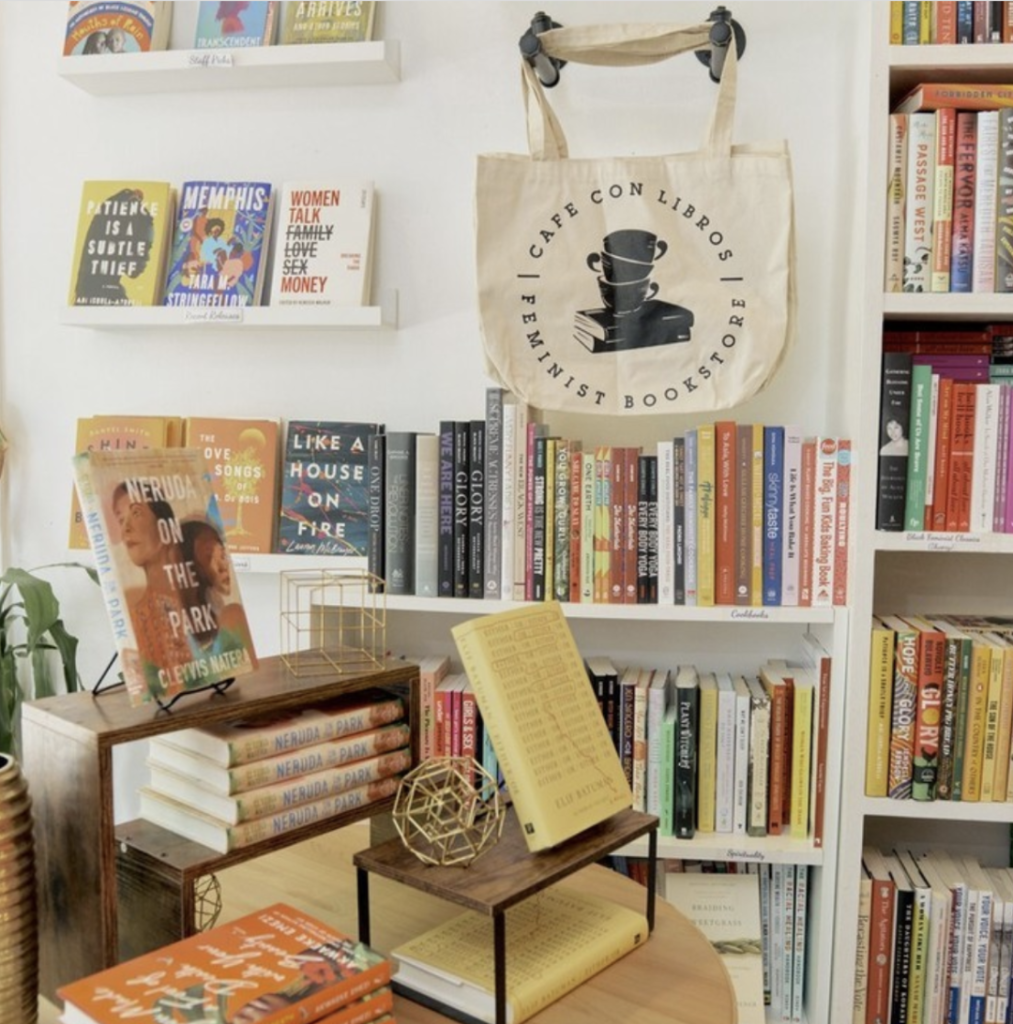
Cafe Con Libros is a charming one-room bookstore and coffee shop at the heart of North Crown Heights. Upon entering, readers will find a small space illuminated by natural light and filled with clean white shelves piled high with black, queer, feminist, and classic literature. Trendy cream-colored tote bags decorate exposed brick walls, and the air is rich with notes of nutty espresso and the sounds of coffeehouse chatter.
The store feels modern, yet historic. Young, yet timeless. To circle the quaint place feels like an invitation to travel both forwards and backward in time, to touch and listen to literary objects as they speak their stories, to find the intersection between books penned by and for women of all different bodies, beliefs, and backgrounds, and to bridge a connection between the turbulent past and relentlessly hopeful present of the surrounding neighborhood.
After all, the unassuming turquoise storefront stands on the frontlines of an uphill battle to unify the gentrified borough of Brooklyn. From the bloody Crown Heights riots that erupted in the 90s to the families of color that are being bought out of their homes today, the shop faces a street with half a century’s worth of racial violence and gentrification bubbling beneath its surface. Yet this conflict never deterred its owner, Kalima DeSuze, from opening her shop. In fact, the neighborhood was why she decided to open Cafe Con Libros.
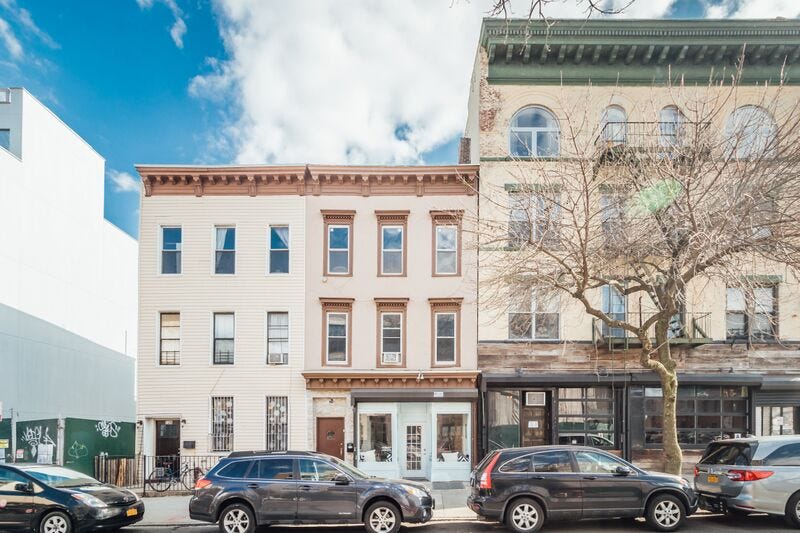
A North Crown Heights native, DeSuze grew up a six-minute walk from the front door of the building that would become her shop. She considers herself interlocked with the culture and history of the neighborhood, reminiscent of a North Crown Heights crowded with old community convenience stores and African hair-braiding spots (Rebecca). “I aim to bring the folks together who would normally not feel comfortable with one another,” she explains (Fernández). DeSuze works hard as an avid reader to disprove the misconception she heard from her Afro-Latina community when she announced her feminist bookstore: “Oh, that’s for white folk, that’s not for us” (Fernández). Her efforts to do so are not left unnoticed. The left-hand window boasts Sally Rooney’s Beautiful World, Where Are You? and Lovely War by Julie Berry, but also features The Crunk Feminist Collection and The Misadventures of Awkward Black Girl by Issa Rae.
The collection quickly reveals DeSuze’s multifaceted desire to challenge her Afro-Latinx community’s views on feminism while mirroring their experiences and giving them a reason to feel a part of the store’s narrative. As her community grows and changes, she doesn’t want her store to be limiting or divisive. She wants it to be intersectional and unifying.
A floor plan of Cafe Con Libros, made by Ellie Pasquale using ThingLink.
Stepping inside, the light from the almost floor-to-ceiling windows brightens the hardwood and makes the white shelves glow. A small circular table sits to the immediate right of the door, highlighting books from local writers in a “customer-facing” design that BookRiot calls modern, eye-stopping, and customer-first (Manusos). Small shelves by the window display staff-picked books for another anchoring touch of community. A bundle of tote bags hang on a rustic rail beside it.
The remainder of the right wall is an impressively large bookcase that displays Cafe Con Libros’ main collection. Tiny tags with elegant, cursive script denote the shelves with hyper-specific genres and age categories. From left to right, the inventory covers cookbooks, spirituality, and healing before moving into fiction like “LGBTQIA+ literature,” “Queer Romance,” “Asian Diaspora,” “Indigenous Writing,” “Young Adult,” “Latina Reads,” “Science Fiction and Fantasy,” “Graphic Novels,” and “Young Adult,” just to name a few. There are even non-book items like little embroidered signs and metal figurines that make the shelves feel more personal and homey, just as the writer Lydia Pyne describes in BookShelf (Pyne).
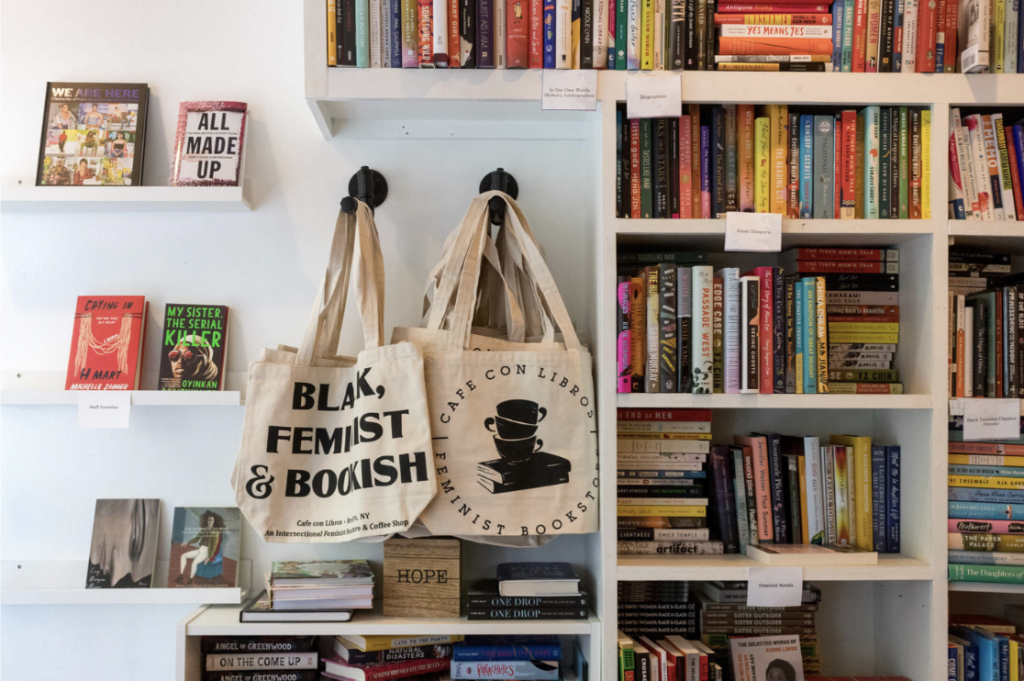
The right wall of Cafe Con Libros, featuring the store’s main collection. Image above taken by Susan De Vries. Image to the right is from Kelsey F. on Yelp.
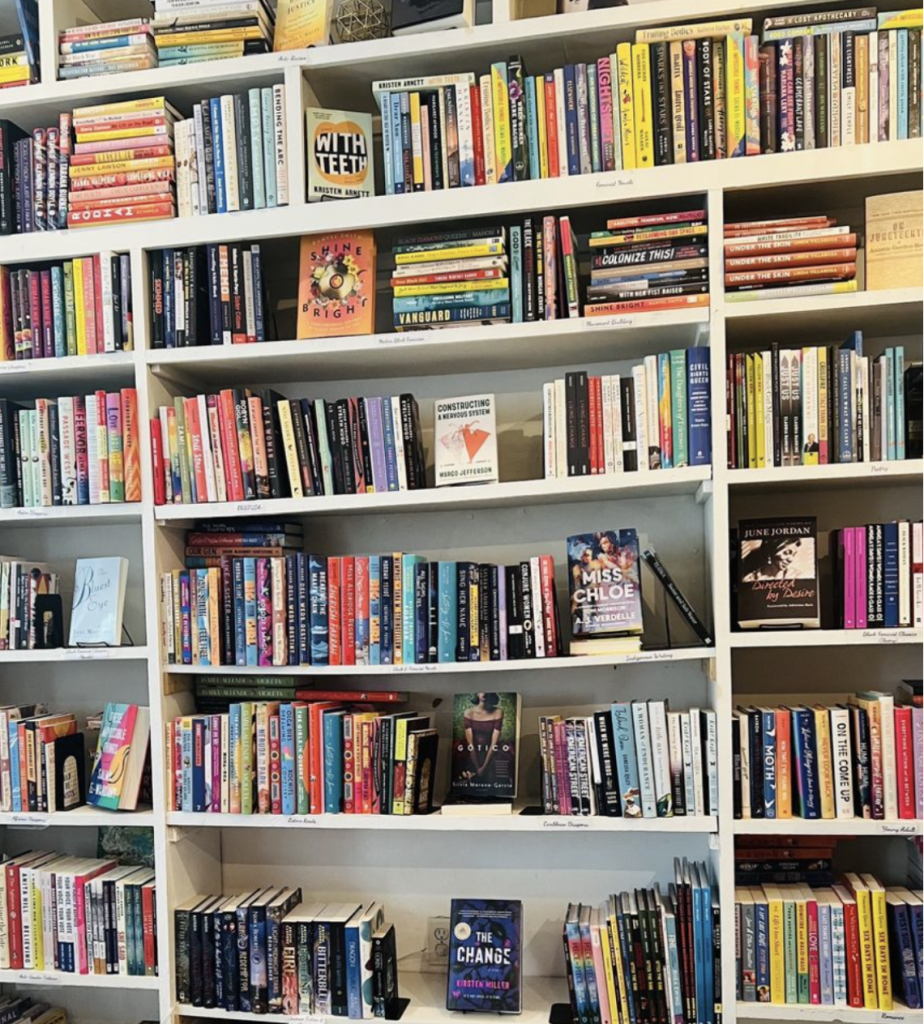
As the academic Daphne Spain argues in her study of Feminist Bookstores, women visit feminist bookstores specifically “to see themselves in the books, and the ways books were displayed simplified their search. It was important to stock books by and about African American and Latina women, and equally important to make those collections visible” (Spain). According to Cafe Con Libros website, the shop aims to “offer feminist texts for all personalities, political affiliations, temperaments, and tastes.” Their selection means to “represent as many identities as possible.” The abundance of hyper-specific genres captures this intention.
Of course, the black feminist classics are front and center. Kalima DeSuze’s favorite book, Toni Morrison’s The Bluest Eye, is always faced out to customers (Abi). Shelf tags like “Modern Black Feminism” and “Black Feminist Classics” have the largest collections, and establish the store as a landmark location for black feminist book-lovers.
The entire top shelf of the bookcase, miscellaneously marked “Feminist Novels,” continues off the right wall and onto the back wall as well, right above the coffee bar, which takes up the entire back right-hand corner of the store.
Their tiny cafe has a rustic yet simultaneously hip and minimalist aesthetic. Mugs hang from the walls, dark umber wood coats the countertop, and a small iPad sits in the place of a traditional register. Coffee is cheap, their largest latte only costing $4, but being criminally delicious. A row of children’s books about civil rights and Black hair line the bottom of the cafe counter, serving as a reminder of a truth DeSuze is passionate about preaching: a coffee shop shouldn’t signal gentrification, because coffee doesn’t belong to the rich and the White. The shop’s name, which is a play on the Spanish phrase for “Cafe Con Leche” — meaning “Coffee With Milk” — translates instead to “Coffee with Books.” Coffee is the fruit of the global south, as she hammers in the interview below with On the Block. The very name of her shop helps her fight the gentrification of coffee and books, and so does the literary display in her miniature cafe.
Continuing through the store clockwise, customers travel from womanhood to girlhood. A sign reading “It’s a girl’s world” to the right of the bar marks the threshold of this new portion of the store: the children’s section, or the place Cafe Con Libros affectionately reserves for their “baby, budding feminists” (“Cafe Con Libros”).
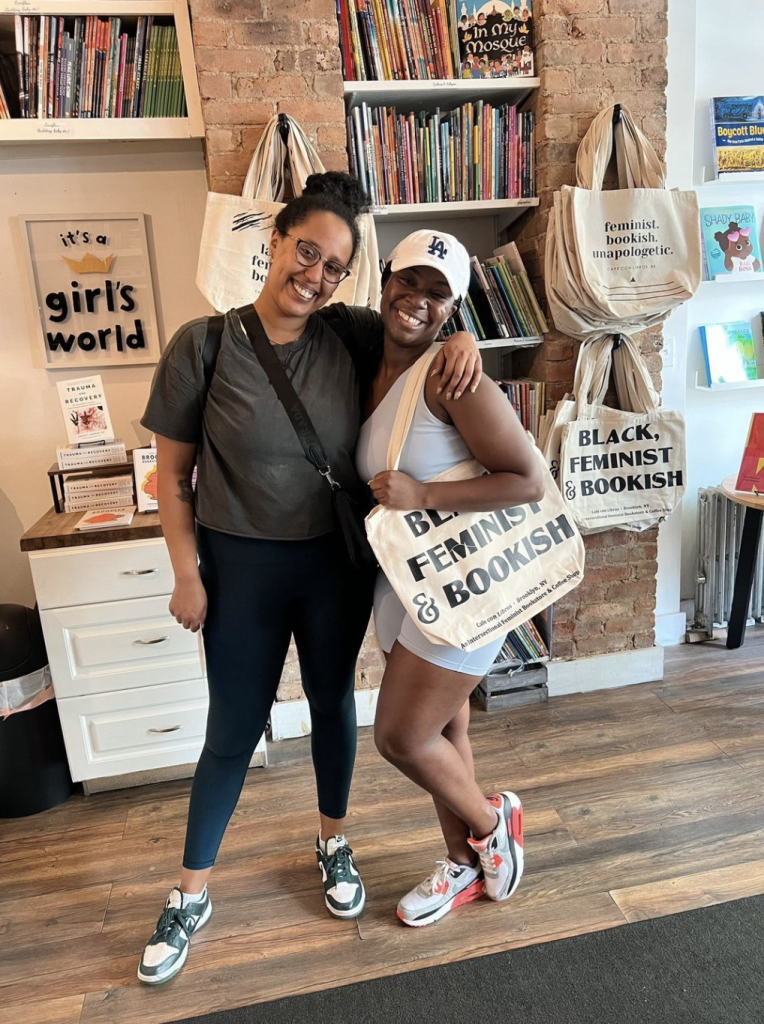
This expanse of wall carries colorful toys, puzzles, and stuffies, as well as an entire bookcase of picture and board books. The tags in this section vary from age categories like “Baby” to genre-specific ones like “LGBTQIA+” and “Civil Rights.” There’s a round table at the end of this wall, symmetrical to the other half of the shop, that features children’s books penned by local authors.
These books for young readers trickle out into the window display. Picture books and toys take up the entire right-hand side of the display, welcoming all the young families local to the area.
And just like that, before you even know it, Cafe Con Libros has circled you back out onto Prospect Street. The seating is permanently outdoors, all year round, feeding customers directly back into the community. On an average day, the storefront on Prospect Street has a sneakered dog walker resting on the bench by its window display, two friends chatting over lattes at the patio table, and a mother and child paging through a crisp new picture book under a striped umbrella. A visiting author may even sit at a small desk on the street corner, signing books for customers and starting conversations with couples walking down the street.
Unlike objects in a museum that often require plaques for historical context and meaning, the objects of a bookstore speak for themselves. They carry their own narrative. But DeSuze shapes a narrative out of this collection of books, builds an inclusive chronotope, as the academic Clifford might say (Clifford). She doesn’t insist that all women are the same, and instead builds a library of all the ways they are different and makes reason to celebrate it — identifying them as various hyper specific categories, but also putting them all together onto the same bookcase in the same small store. She resists the sort of other-ing and separatism that first poisoned her neighborhood.
DeSuze is ultimately a community builder. All women are invited to spend an afternoon in the cramped space of Cafe Con Libros, bumping elbows at book clubs while sipping their warm mugs of coffee, cracking open their new paperbacks. She designed Cafe Con Libros to not only be a mirror for her community, but also a window to see into the lives of others.
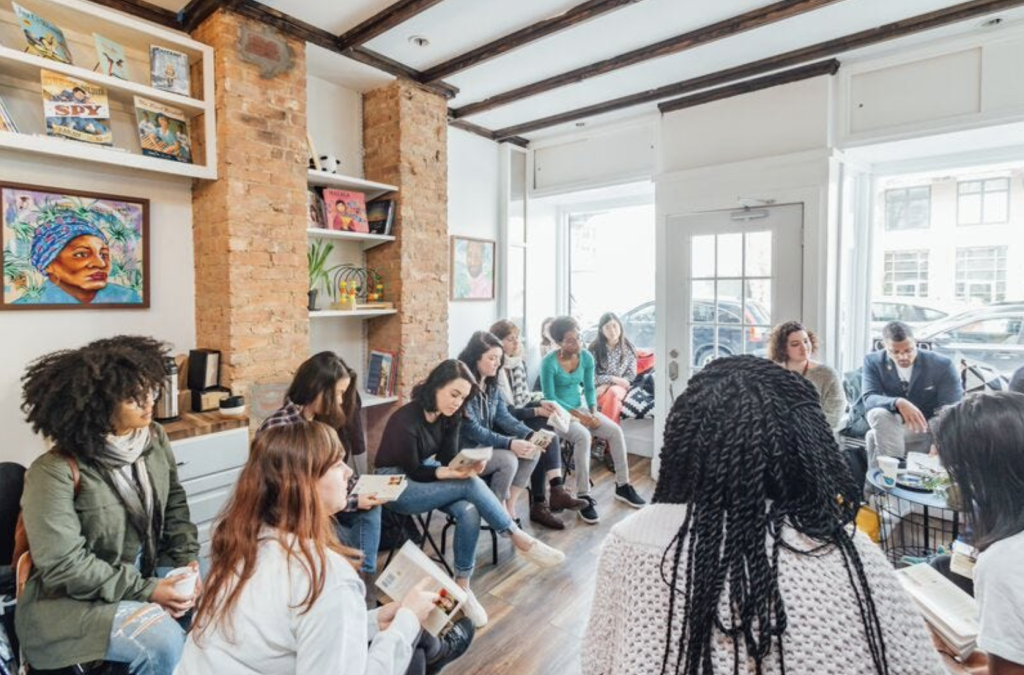
Text Citation
Abi. “Cafe Con Libros, A Groundbreaking Book Store in Brooklyn.” YouTube, 19. May 2021 https://www.youtube.com/watch?v=V-_RHSS-ttg&t=145s
Clifford, James. The Predicament of Culture: Twentieth-Century Ethnography, Literature, and Art. Harvard University Press, 2002.
Fernandez, Stacey. “This Afro-Latina’s Feminist Bookstore Is Building Community in Gentrifying Crown Heights.” Remezcla, 10 Mar. 2018, remezcla.com/features/culture/this-afro-latinas-feminist-bookstore-is-building-community-in-gentrifying-crown-heights/.
Manusos, Lyndsie. “The Science and Recent History of Bookstore Design.” Book Riot, 22 Feb. 2022, bookriot.com/the-science-and-recent-history-of-bookstore-design/.
“Menu: Cafe Con Libros.” Cafe Con Libros, www.cafeconlibrosbk.com/menu. Accessed 1 Nov. 2023.
Pyne, Lydia. Bookshelf. Bloomsbury Academic, 2019.
Rebecca. “Badass Women: Kalima Desuze, Founder of Feminist Bookstore, Cafe Con Libros.” Medium, Coconuts, 28 June 2018, medium.com/coconuts/badass-women-kalima-desuze-founder-of-feminist-bookstore-cafe-con-libros-c64e0f8ed358#:~:text=%E2%80%9CI%20have%20a%20deep%20affinity,wants%20to%20continually%20invest%20in.
Spain, Daphne. “Feminist Bookstores: Building Identity.” Constructive Feminism: Women’s Spaces and Women’s Rights in the American City, 1st ed., Cornell University Press, 2016, pp. 84–110. JSTOR, http://www.jstor.org/stable/10.7591/j.ctt18kr5mx.8. Accessed 7 Oct. 2023.
Image Citations
Cafe con Libros. @cafeconlibros_bk. Instagram. https://www.instagram.com/cafeconlibros_bk/
F., Kelsey. Yelp. https://www.yelp.com/user_details?userid=nL8Ub9QbzrSqWY0LlJMxpA. Accessed 1 Nov. 2020
De Vries, Susan. “Cafe Con Libros Serves up Coffee and Community in Crown Heights.” Brownstoner, 19 Nov. 2021, www.brownstoner.com/brooklyn-life/crown-heights-bookstore-cafe-con-libros-724-prospect-place-feminist-bookclub-kalima-desuze/.
“Portraits by Chris Setter.” NYC Photographer Chris Setter, www.chrissetter.com/. Accessed 18 Sept. 2023.
Video Citations
Aboveboard Media. “On the Block | Cafe Con Libros.” YouTube, 5 Mar. 2021, https://youtu.be/oGQtWRjdmLE. Accessed 7 Oct. 2023.

0 Comments